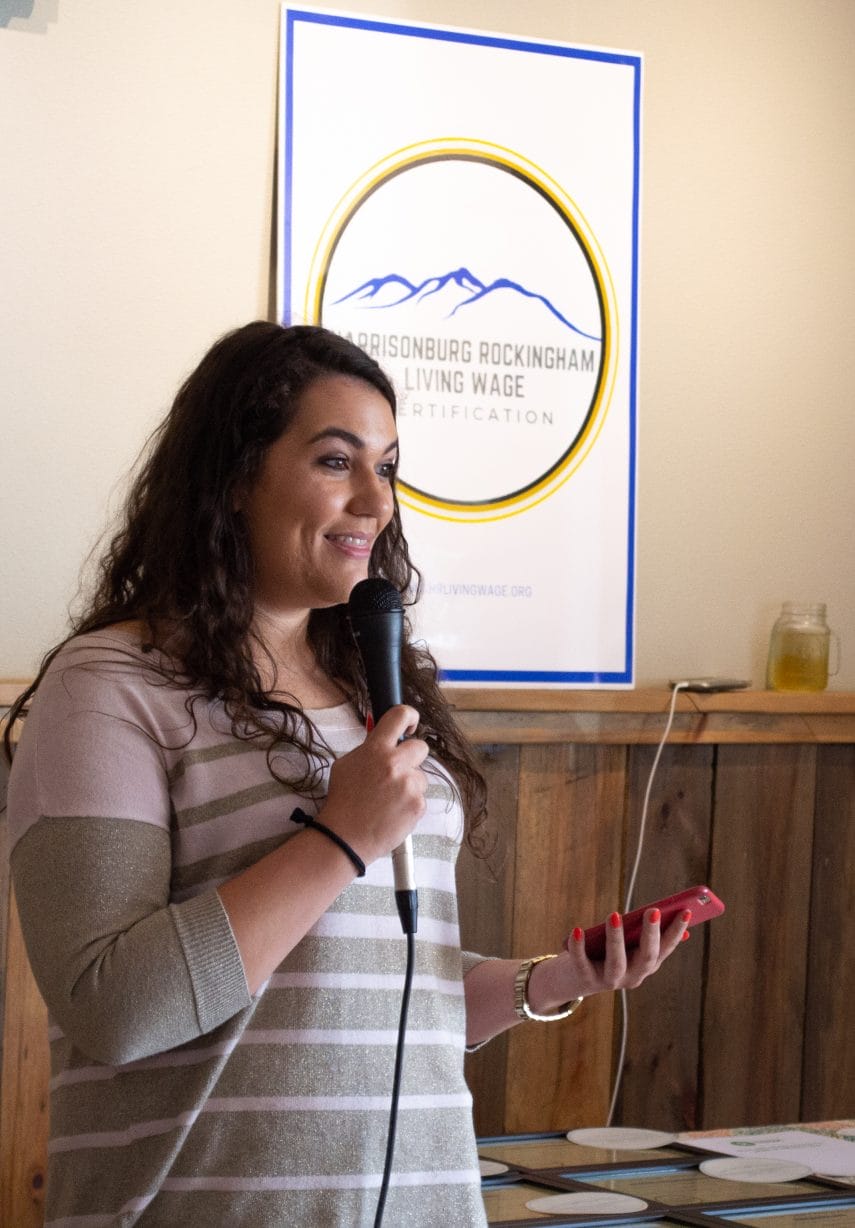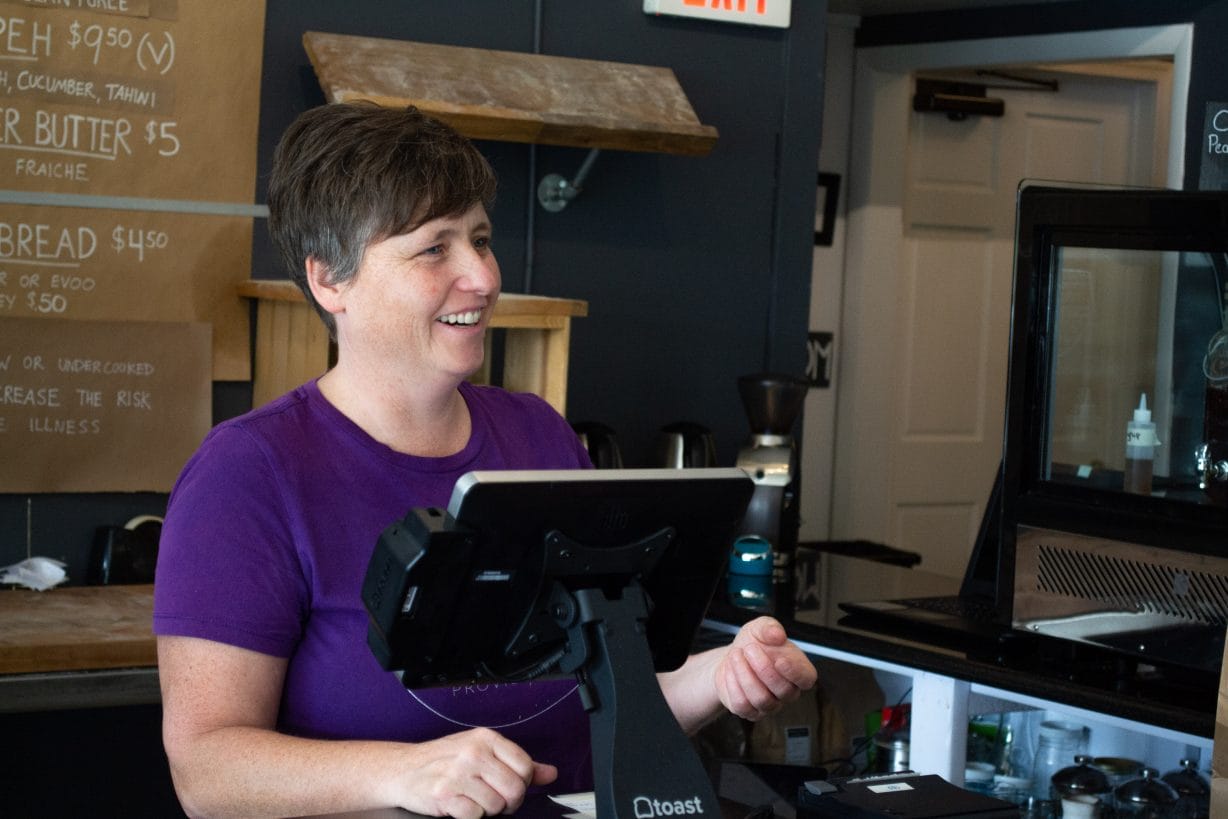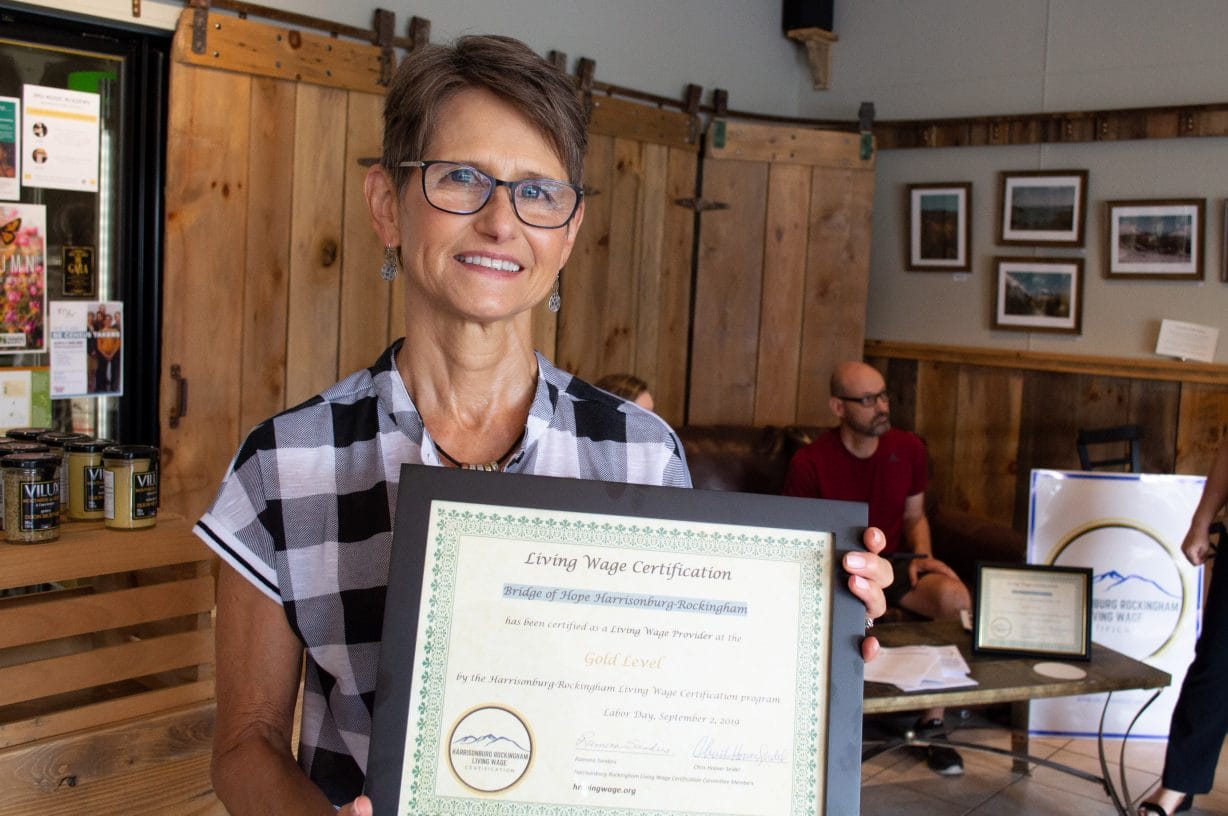By Randi B. Hagi, senior contributor
Instead of lobbying for policy changes in Richmond and Washington, a new group is pushing for raising workers’ pay by gathering voluntary commitments from — and cheering on — local employers that pay their staff a “living wage.”
“Labor Day is a time to celebrate workers,” Amanda Silcox said at the launch event for the Harrisonburg-Rockingham Living Wage Campaign at Gray Jay Provisions on Monday morning. Silcox is the Economic Justice Program Manager for the Virginia Interfaith Center for Public Policy, a non-partisan advocacy coalition that helped the local campaign’s launch.

Silcox said her organization and the campaign “are working towards a day when all people can earn a living wage, regardless of their job.” And the first step the group took was to publicly recognize businesses and nonprofits that chose to pay above the $7.25 federal minimum wage and enough to constitute a living wage.
The term “living wage” can be fluid because it often varies by location because of differences in costs of living. The United Ways in Virginia published a report in 2017, analyzing the financial hardship of working-class families who struggle to make ends meet, including paying for affordable housing. That study — dubbed the “ALICE” report, which stands for Asset-Limited, Income-Constrained, Employed, showed 63 percent of the more than 16,600 households in Harrisonburg fell below that ALICE threshold.
Specifically, the report said to afford a “modest” living in terms of housing, childcare, food, transportation, and healthcare, without accumulating any savings, requires a single adult to earn $22,056 per year (a $11.03 hourly wage) and a young family of four to earn $61,200, which works out to a $30.60 hourly wage for one income-earner or two $15.30-per-hour full-time jobs.
In front of about 25 people who attended Monday’s event, the Harrisonburg-Rockingham campaign announced the six employers who qualified for the group’s three levels of certification — a designation that came with a plaque and window decal:
- “Gold” employers that pay at least $15 an hour or $13.50 and offer healthcare: First Bank & Trust Company, Community Mennonite Church and Bridge of Hope Harrisonburg-Rockingham, a Christian organization that provides case management and support to families facing homelessness.
- “Silver” employers pay at least $12.50 an hour or $11 and offer healthcare: Friendly City Food Co-op and Trinity Presbyterian Church.
- “Aspiring” employers pay at least $11 an hour, or $9.50 and offer healthcare, and are working to reach “silver” status within two years: Gray Jay Provisions.
“These businesses are leading the way,” said Chris Hoover Seidel, the director of Bridge of Hope and a member of the campaign’s steering committee. She encouraged attendees to talk about living wages with owners of establishments they patronize.

Such an approach essentially skips the traditional lobbying to change policy, such as urging elected officials to raise the mandatory minimum wage.
Virginia is one of 39 states that operates under the “Dillon Rule,” in which localities only have authority over matters expressly granted to them by the state government. Because that prevents localities like Harrisonburg City from setting their own minimum wages, the campaign targets employers directly, to have them voluntarily commit to paying their staff a living wage.
Silcox called this “a local response to a national problem.”
She said communities such as Northern Virginia, Richmond, Blacksburg and James City County already have living wage campaigns. Charlottesville residents launched one on Monday too.
Political issue this fall
Another path would be a mandatory state-wide minimum wage increase if the General Assembly agreed — but that has been a point of contention, both at the Virginia Capitol and on the campaign trail between Democratic and Republican legislative candidates.
Brent Finnegan, who is among the founders of local Living Wage Campaign, also spoke at Monday’s event about why he said he believes a wage increase is necessary for area residents.
Finnegan is running for the 26th House of Delegates district this fall as a Democrat and has made raising the minimum wage a key point in his platform.
“The majority of the people in Harrisonburg are either living in poverty, or they’re in the ALICE population,” Finnegan said.
But whether raising the minimum wage in Virginia is the best way to help those people is a major point of difference in the House of Delegates race.
Del. Tony Wilt, R-Broadway, told The Citizen in an interview this June that state government raising the mandatory wage on workers too far and too fast could have a detrimental effect on economic growth — and, thus, the availability of jobs.
Small businesses might not be able to afford to hire an additional employee if they have to pay more, he said. And even if a mandatory wage increase only targeted larger corporations, that might entice more workers to abandon smaller companies to work for those larger chains, he added.
“That’s how small businesses will be hurt by this,” Wilt said.
When the issue came up during the General Assembly session in January, the Virginia Chamber of Commerce took a similar position to Wilt. It released a fact sheet opposing a bill that would have raised the minimum wage to $15.
“The business community is in agreement that too many Americans are living at or near the poverty line,” the chamber said as part of its fact sheet. “However, raising the minimum wage to $15 fails to solve this problem and will only create new problems for workers and business owners.”
The chamber cited a 2014 report from the Congressional Budget Office said while raising the federal minimum wage to $10.10 an hour would benefit many workers, it would eliminate as many as a half-million low-wage positions.

Employers making a choice
Lois Shank, chair of the Bridge of Hope board of directors, accepted the plaque for her organization, which decided to apply for certification earlier this year. The organization has two employees.
“It was easy for us because we were already doing it,” Shank said. It also fit with the organization’s ethos.
“Our nonprofit organization is all about supporting families who are facing homelessness,” Shank said, many of whom are “directly affected by low incomes.”
Ramona Sanders, another steering committee member who organized the event, told The Citizen she believes in the campaign’s mission because “at one time I was a single parent, raising a daughter by myself.”
Now, technically retired but volunteering for a variety of activism projects, she said she wants to push Harrisonburg to offer a better economic environment for those like her younger self.
“By volunteering,” she said, “you vote every day about the kind of community you want to live in.”
— Ryan Alessi contributed to this report with quotes from a June interview with Del. Tony Wilt, R-Broadway.
Journalism is changing, and that’s why The Citizen is here. We’re independent. We’re local. We pay our contributors, and the money you give goes directly to the reporting. No overhead. No printing costs. Just facts, stories and context. Thanks for your support.













